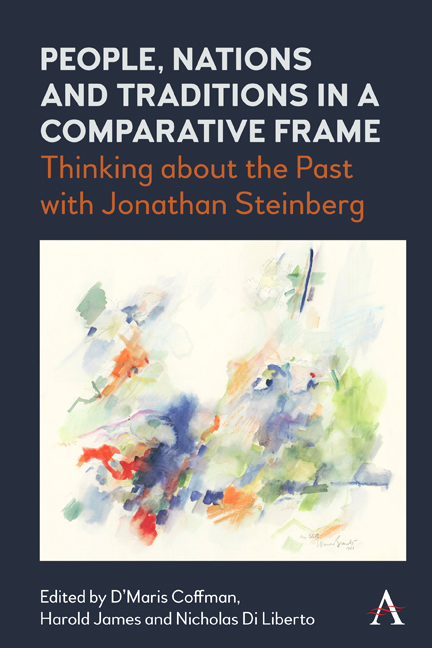 People, Nations and Traditions in a Comparative Frame
People, Nations and Traditions in a Comparative Frame Book contents
- Frontmatter
- Contents
- Foreword
- Acknowledgements
- Notes on Contributors
- Introduction
- Part One Methodological Pluralism and New Applications
- Part Two Personal and National Character
- Part Three Society, Families and the Sovereign Self
- Part Four History Out of Sync: Modernity and Tradition
- Part Five History, Narrative and the Human Condition
- Afterword
- Bibliography of Jonathan Steinberg’s Works
- Index
Chapter Four - The Warburgs and Yesterday’s Financial Deterrent
Published online by Cambridge University Press: 23 February 2022
- Frontmatter
- Contents
- Foreword
- Acknowledgements
- Notes on Contributors
- Introduction
- Part One Methodological Pluralism and New Applications
- Part Two Personal and National Character
- Part Three Society, Families and the Sovereign Self
- Part Four History Out of Sync: Modernity and Tradition
- Part Five History, Narrative and the Human Condition
- Afterword
- Bibliography of Jonathan Steinberg’s Works
- Index
Summary
Jonathan Steinberg was a brilliantly inspirational guide to European history when I was a student in the mid-1970s. He brought two aspects that no other European historian (at least in Cambridge) at the time had: first, the conviction that there were important lessons that could be derived from the past; and second, that understanding the past was a complex task that required a deep exercise of the imagination and an artistic quality in simplifying it. There were then two adages that cropped up time and time again in his lectures: the German impressionist Max Liebermann's dictum ‘Skizzen heisst weglassen’ (‘to sketch is to omit’) – that was basically meant positively – and was an agreeable contrast to the work of most of the British historians at the time who were settling down to study what looked like smaller and smaller problems (local or county rather than regional studies of the history of early modern England). And secondly, he cited ‘his old Harvard philosophy tutor’ (we never found out the name): ‘It ain't no honest poker game, but it's sure the best we got in town.’ In addition, Jonathan always emphasized the importance of individual personalities and their psychologies, even or especially in dealing with a structural or geopolitical challenge.
From the 1960s, we could all feel that we lived in the shadow of the arms race between the superpowers. Jonathan's first book, Yesterday's Deterrent, explicitly conjured up the nuclear race in its title and delivered a grim message: the idea of building up big battleship fleets had completely failed to provide balance or to make the world safer. Instead, the search for security and a deterrent had launched the tragedy of the First World War. Thus, the pre-1914 naval race was really the best poker game in town, not only for interpreting the deep fears of the present but also for suggesting solutions that might lead to an escape from the security dilemma (arms control, détente, etc.). There was obviously much that was left to be filled in by later work such as Volker Berghahn's magisterial Tirpitz–Plan, but Jonathan's powerful sketch was the beginning of a historiographical edifice.
Today, the end of the Cold War means an altered geostrategic reality. But the 1914 parallel is still being made, and just as then, some may feel that the poker game is not honest.
- Type
- Chapter
- Information
- People, Nations and Traditions in a Comparative FrameThinking about the Past with Jonathan Steinberg, pp. 59 - 70Publisher: Anthem PressPrint publication year: 2021
